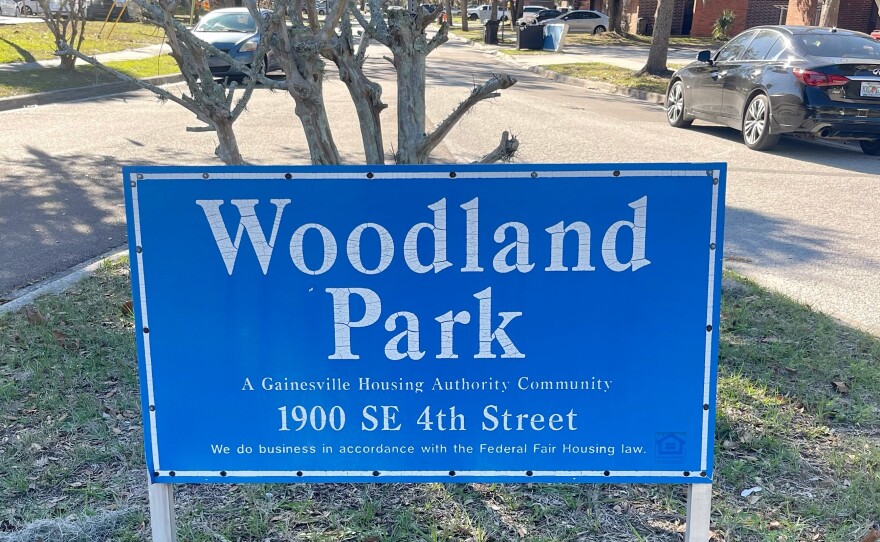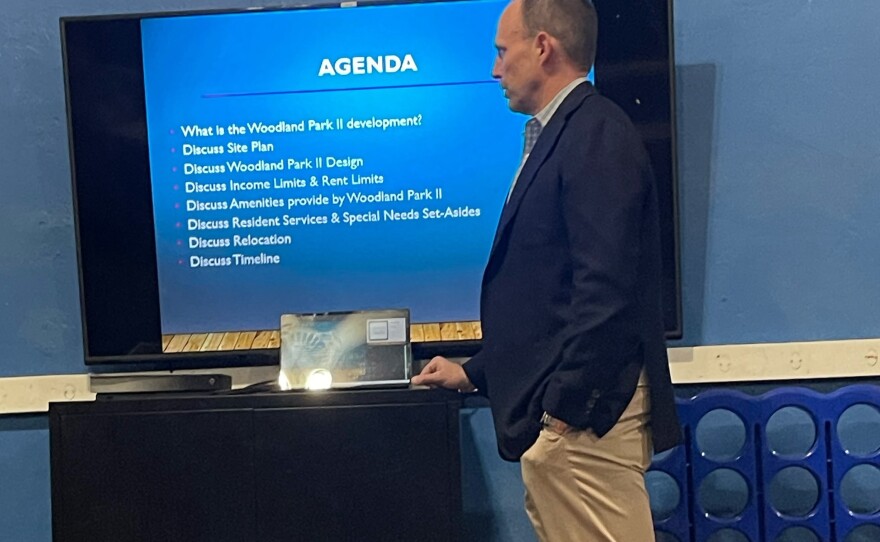Residents of the Woodland Park neighborhood should expect to pay their own utilities, add in-unit appliances to their homes and walk on an upcoming $200,000 walking trail, among other planned upgrades.
The Gainesville Housing Authority announced these upgrades Wednesday and said the complex will enter its second phase of development beginning in December.
Phase one of development, which ended in 2020, included the completion of 96 multifamily apartments and a clubhouse. By the end of 2024, the plan is to demolish 76 units to make room for 144 upgraded apartments.
Thirty Gainesville residents attended the town hall-style meeting Wednesday night to discuss the next steps and timeline for completing redevelopment.

Among the participants was Joshua Shraiberg, 19, a student at the University of Florida majoring in finance.
“I want to better the city of Gainesville as a whole,” Shraiberg said. “I know I’m not a neighborhood resident, but I believe my suggestions should still be accounted for.”
While not a tenant of Woodland Park, he said he attended the workshop in hopes that his input could help further the development of this local community.
Held at the Woodland Park Boys & Girls Club, the workshop commenced with a warm welcome from Pamela Davis, chief executive officer of the Gainesville Housing Authority.
She turned the stage over to Brian Evjen, the president of Newstar Development, to discuss phase two and share the vision and timeline for the Woodland Park redevelopment.
Once completed, the 144 new apartments will be located at 24 SE 19th Place, an area located on the eastern side of the neighborhood.
“Of the 144 new units, 42 will be one-bedroom-one-bathroom, 66 will be two-bedroom-two-bathroom and 36 will be three-bedroom-two-bathroom,” Evjen said.
In addition, the on-site amenities will include a basketball court, a baseball field and multiple pavilions, as well as a $200,000 walking trail that connects to the adjacent Woodland city public park.

Among the assembled audience, neighborhood resident Emily Thompson stood to interject.
“A $200,000 walking trail?” Thompson, 76, asked. “Why on earth are we spending money on that when the crime rates in this area are through the roof? I love this place, but we need to solve real-life problems, not spend our entire budget on a walking trail.”
After considering her concerns, Malcolm Kiner, the chief operating officer of the Gainesville Housing Authority, took the stage to address any issues relating to the affordability of the new apartment units.
Throughout his presentation, he emphasized the importance of having a mixed-income community.
“It is crucial that a variety of people from different backgrounds come to live here,” Kiner said. "It plays a large role in bringing everyone together.”
Fifteen units will be available for families earning at or below 33% of the area median income and 129 units will be available for families earning at or below 60% of the area median income, Kiner said.
Lola Ramsey, 63, has been a resident of Woodland Park since her retirement in 2019.
“I live off of my retirement savings,” Ramsey said. “As a retired teacher, I’m glad they are taking into account that some of us simply would not be able to afford higher prices.”
One difference, Davis said, is that unlike phase one, residents will pay their own utilities.
However, returning residents in good standing will only be obliged to pay 30% of their adjusted annual income toward rent at Woodland Park.
“Project-based vouchers will be sent out to subsidize the difference, so our clients will only have to pay that portion of their income,” Davis said.
Jonathan Bateman, 74, is a retired custodian.
“I grew up poor and never have had a lot of money to spare,” Bateman said. “I’ll take what I can get when it comes to reduced rent.”
The upcoming addition of state-of-the-art in-unit appliances sent a wave of enthusiasm through the crowd.
“Hallelujah!” Amanda McNair, 67, exclaimed. “I never had a washer and dryer in my house before; man, am I excited.”
Organizers emphasized the importance of community input, stressing that the residents held the key to ensuring the redevelopment aligned with their unique needs.
“One thing that initially attracted my wife and I to this neighborhood is the board meetings,” said Xavier Rosen, 45, a sales associate. “We used to have them once a week but that slowly died down. In the second phase, ensuring these meetings are held weekly and our claims are met will be a big factor in lowering the crime rate in Woodland Park.”
Construction is set to commence on Dec. 15 2024, and its estimated completion is July 1, 2026.
“I know it’s far away, but I look forward to watching this neighborhood improve,” Bateman said. “It sounds corny, but home is where the heart is, and I couldn’t be prouder to call Woodland Park my home.”





